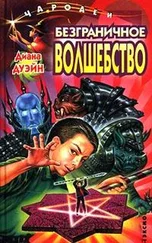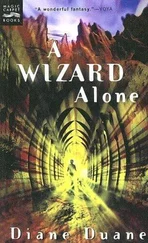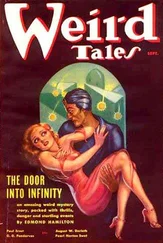Диана Дуэйн - The Door Into Shadow
Здесь есть возможность читать онлайн «Диана Дуэйн - The Door Into Shadow» весь текст электронной книги совершенно бесплатно (целиком полную версию без сокращений). В некоторых случаях можно слушать аудио, скачать через торрент в формате fb2 и присутствует краткое содержание. Жанр: Фэнтези, на английском языке. Описание произведения, (предисловие) а так же отзывы посетителей доступны на портале библиотеки ЛибКат.
- Название:The Door Into Shadow
- Автор:
- Жанр:
- Год:неизвестен
- ISBN:нет данных
- Рейтинг книги:3 / 5. Голосов: 1
-
Избранное:Добавить в избранное
- Отзывы:
-
Ваша оценка:
- 60
- 1
- 2
- 3
- 4
- 5
The Door Into Shadow: краткое содержание, описание и аннотация
Предлагаем к чтению аннотацию, описание, краткое содержание или предисловие (зависит от того, что написал сам автор книги «The Door Into Shadow»). Если вы не нашли необходимую информацию о книге — напишите в комментариях, мы постараемся отыскать её.
The Door Into Shadow — читать онлайн бесплатно полную книгу (весь текст) целиком
Ниже представлен текст книги, разбитый по страницам. Система сохранения места последней прочитанной страницы, позволяет с удобством читать онлайн бесплатно книгу «The Door Into Shadow», без необходимости каждый раз заново искать на чём Вы остановились. Поставьте закладку, и сможете в любой момент перейти на страницу, на которой закончили чтение.
Интервал:
Закладка:
THE DOOR INTO SHADOW
fast, and she had trouble deciding what to share, what to keep to herself.
She shrugged. The future was merely another kind of pre-sent to a Dragon, malleable as the past, part of the game. What mattered was what the player intended to be.
In one word, her newfound Name, she told them, "We'll keep your secret," Freelorn said just above a whis-per.
Segnbora smiled at them, knowing that the One she meant to hear her Name had heard it through them, then waved
ffood night, and headed for the stairs. Along the upper para-pet, Hasai lazily put out a single forefoot — all he needed to do to keep up with
her.
"No more words?" he said. "What should I say?"
Slowly Segnbora lowered her head to gaze back down the parapet; where Freelorn took back from Herewiss the lovers cup she had left them, and drained it-and found it still full. "That,"Hasai said. "Forever."
Lost between laughter and tears of joy, Segnbora nodded, reached out to her mdaha, and led him off into their future, and to bed. T/ME, CALENDARS, AND RELATED SUBJECTS
moftorw o/i/iDMiddle Kingdoms' world around its Sun match those of Earth around Sol (except for negligible variations, such as those caused by sister planets missing in their solar system and present in ours). Their year is therefore the same length as ours—365 days, 5 hours, 48 minutes, 48-odd seconds. Though in Segnbora's time clocks still have only hour hands, the astronomers of the Kingdoms have evolved their own methods of handling the year, and the little pieces of it that tend to pile up as time passes and throw calendars out of alignment with the seasons.
Both Arlen and Darthen use a 360-day "year" of four 90-day "seasons" that correspond to our winter, spring, summer, and fall. Days are counted straight
file:///G|/rah/Diane%20Duane%20-%20Tales%20Of%20The%20Five%2002%20-%20The%20Door%20Into%20Shadow.htm (152 of 155) note 21 Note21 2/13/2004 11:52:51 PM
through each season, and spoken of as "the fifth of Winter," "the thirty-eighth of Summer, " and so forth. In addition, the First of each season is always a major holiday, tied to solstice or equinox — Opening Night for Winter (the only one of the holidays that doesn't fall directly on solstice or equinox), Maiden's Day for Spring, Midyear's Day for Summer, and the Harvest Festival (either Lion's Day or Eagle's Day) for Fall. The five remain-ing days are intercalated and belong to no season: they are placed between the end of Fall and the beginning of Winter, and during these cold days at the bottom of the year, the Dreadnights as they 're called, no enterprise is begun, no childnaming or marriage celebrated. They are the Shadow's nights, and unlucky. Every fourth year a sixth intercalary day (in Arlen Endethne, "Lady's Day," in Darthen AerrudЈj, "the Goddess 'Joke") is added between the Dreadnights and Opening Night, to deal with the need for a leap-year day.
However, this still leaves a significant fraction of time out of the reckoning. The addition of the leap-day to compensate for the 5h-48m-48s leftover at year's end is in fact an overcompensation. If left uncorrected, each year will be 11.2 minutes short. This may not sound like much, but in our world in the past has led to awful misalignment of the calendar year with the seasons — the fint day of spring falling in December, for example. But this backward drift of dates is preventable by any number of methods. The astronomers of the Kingdoms found that the eleven-minute deficit will amount to a full day's error
in 128y-208d-13h-38m-21.125s. Therefore, once every 128 years, that 208th day (which by our calendar would be July 19th) is dropped from the year entirely, or rather converted to July 20th; that date in turn becomes the 29th of Summer rather than the 28th, and is called the Festival of the Lost Day. (Thefestival is devoted to pranks, pratfalls, drinking sprees, and attempts to lose things, usually unwanted ones. There are also lying contests, with prizes for the best explanation of where the Lost Day went.) This system of adjustment runs independently of that for leap-year days. Though it would probably be more efficient to combine the adjustment systems, as our culture does, the Kingdoms' astronomers are quick to point out that this would mean one less holiday.
It is quite true that even this adjustment is not totally sufficient to keep the calendar in line with the seasons and the Sun. There is still an unadjusted error that makes the year too long 631 0.0003 day, which will pile up to three days in each 10,000 years. However, in the words of Talia d' Calath, the Grand Royal Astronomer to King Berad ofDarthen, "It is possible to worry too much, too far in advance. " The Dragons have promised to remind human beings to insert another one-day intercalary day every 3300 years — though there is still disagreement over why they laughed so hard when they promised. There are of course many minor local holidays not mentioned here. But neither Arlene nor Darthene calendars include anything like weeks or months. One may indicate a given day by season and number: or say "four days ago," or' 'six days from now," or "a month and three days," etc. ' 'Months" (actually the word is isten in both languages, very like the Greek Af Kafiacr which we translate as "lichtgang" or "Moonreturn") are sometimes broken down to 29 days for counting purposes, but this is rare. Mostly a month is reckoned from a phase of the Moon to its next occurrence, most frequently full to full. This might be expected in a largely agrarian culture, where the times of planting are important. But to the people of the Kingdoms, the Moon is the living vigil of the Goddess, mirroring Her changes in its own as it slides from Maiden's slim crescent to Bride's and Mother's white full to Crone's waning sickle to Moon-dark perilous and hidden; and for the most part people have a fondness for the Moon and enjoy reckoning by it, without resource to numbers.
Astronomers — and, of course, sorcerers and people with the blue Fire — are cognizant of such lunar functions as node crossings and regression of nodes, apogee and perigee and advance of the perigee point, librations and nutations, and eclipses both lunar and solar, such being important to their work. But (and very sensibly) no one has ever particularly cared about what the lunar calendar does in relation to the solar one. The only real notice taken of alignment between the two is in mention of Nineteen-Years' Night, when the Moon is full on Opening Night and wreaking with sorcery or Fire is particularly potent.
There is a tendency for Moon cycles to be referred to by name, the names
j fiering from area to area. For example, the first full Moon of Spring, and the days following it from waning to dark to new crescent to full again, is ually called the "Song Moon" in Arlen, while some Darthenes call it the лUnicorn's Moon," and some others, the "Maiden's Moon" or the "Mad Moon " Special note is taken of the Harvest Moon in most places, both because fthe shortening of its rising time and in memory of the bloody harvest cut at Bluepeak during one of its risings an age ago; the full Moon that follows the file:///G|/rah/Diane%20Duane%20-%20Tales%20Of%20The%20Five%2002%20-%20The%20Door%20Into%20Shadow.htm (153 of 155) note 22 Note22 2/13/2004 11:52:51 PM
Harvest Moon is always the Lion's or Eagle's Moon, in Earn's and Healhra 's memory.
Since the memory of the times before the Catastrophe has largely been lost, years are counted from the coming of the Dragons and the destruction of the Dark, and noted by number and the abbreviation for pai Ajnedare deruwin, "after the Arrival." Example: Segnbora's birthday is Spring the 57th, 2098 p.a.d.
ON DRAGON ANATOMY AND PHYSIOLOGY
The Dragons are perhaps purposely vague about their very beginnings. "Thinking about a time before their own consciousness," d 'Welcaen reports, "makes them nervous." But the earliest Dracon memories recall a time when the Homeworld was populated by plant-analogs and other life forms. There was a food chain, and Dragons had use for the internal organs which now exist only in extremely debased vestigial forms. Somewhere along the line — possibly due to changes in the Homeworld's orbit, or in its star's characteristics — the planet's seas began to evaporate, and its atmosphere to strip off. The Dragons report this as taking many thousands of their lifetimes. Converting this time to human standards is difficult, and gives answers ranging from one to six million years. This may seem like quite a while, but it isn't really, for an organism whose average generation is from four to six thousand years. The Dragons had to adapt in a hurry to the changes in
their environment.
Already silicon-boron based — and what their atmosphere and "seas" con-sisted of is still a matter for conjecture — the Dragons' evolution went in the most efficient possible direction. Their anatomy began adjusting itself toward extreme lightness, for maximum efficiency in soaring in search of food. As food got scarcer due to increased irradiation, wild mutations got more com-mon — including one that became most successful: the alteration of silane rings in the black wing-membranes, so that they became in effect giant solar cells, using the already-existing neural pathways for conduction of generated bioelectricity. Dragons born with this mutation, needing no normal food, thrived and multiplied, and soared further and further sunward for food. The increased irradiation induced more gene changes and mutations in brain physiology, so that the "highflyers" found themselves able to manipulate "force" — magnetic fields, gravity wave-Jields, and other instrumentalities less classifiable to humans. Organs used for digestion, respiration, and elimina-tion slowly went vestigial, until finally the "late model" Dragon was left— an efficient, flying energy-storage machine, spaceworthy, tolerant of extreme high and low temperatures (as had become commonplace on the Homeworld),
and able to express that energy as Dragon/ire and use it as tool and wea-pon.
The reasons for that particular manifestation are debatable, but dWelcaen suggests that Dragons feel about their mouths as humans feel about their hands. Dracon psychology says that language is the primary means of effective sur-vival: which perhaps explains why, even after their development of under-speech, the Dragons never gave up communication by way of vocal speech. Even their tongues still work after all these centuries — though they're not necessary: Dracon sound generation long ago went over to non-acoustic mech-anisms like those of whales. Fluid-Jilled or stressed-solid-Jilled cavities stimu-lated by "muscle" contraction, or catalytic chemical reactions, or neural/mem-brane synergies, or all three, allow Dragons to communicate with precision and stunning variation in almost any medium except empty space, and also permit the super-prolonged hisses, three— to eighteen-tone chords, and choral-verbal speech for which they 're best known.
Dragonfire, according to dWelcaen, is strictly a "psi" phenomenon allied to "manipulation of force, " and as complicated for a Dragon as breathing for a human — a Dragonet can flame before it can talk. The skill is almost wholly a constructive one these days; the times when a Dragon would have to melt several tons of lead-bearing stone over itself to protect it from a stars term, or blast its way out of the covering again, are long past. A. Dracon name for the Sun that shines on the Middle Kingdoms is hfa-Aass'te're, "the Shallows" — a pale, cozy little star, tame and safe compared to the mad fire of the Homestar in its last days. These days Drag&nfire is for show, and for nn's'hraile, in a particularly heated argument; for imilding; and, when words fail at last, for mating fights, when hottest Jire decides who will reproduce, and who will go very suddenly mdahaih.
Интервал:
Закладка:
Похожие книги на «The Door Into Shadow»
Представляем Вашему вниманию похожие книги на «The Door Into Shadow» списком для выбора. Мы отобрали схожую по названию и смыслу литературу в надежде предоставить читателям больше вариантов отыскать новые, интересные, ещё непрочитанные произведения.
Обсуждение, отзывы о книге «The Door Into Shadow» и просто собственные мнения читателей. Оставьте ваши комментарии, напишите, что Вы думаете о произведении, его смысле или главных героях. Укажите что конкретно понравилось, а что нет, и почему Вы так считаете.



